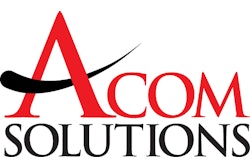Good news for solution providers, but list of leading players includes some surprises
Dedham, MA — — June 21, 2004 — The market for supply chain management solutions is set to grow at a moderate clip over the next four years, but some of the leading players in the market are turning out to be companies not traditionally thought of as supply chain solution providers, according to a recent report from technology research firm ARC Advisory Group.
Under ARC's definition, supply chain management (SCM) includes all supply chain planning, collaboration and execution applications. Overall, the worldwide SCM market has become a maturing market characterized by slower growth and supplier consolidation, ARC wrote in the report "Supply Chain Management Worldwide Outlook."
The market, which totaled $5.1 billion in 2003, will hit $7.4 billion in 2008, ARC estimates. The compounded annual growth rate (CAGR) is 7.4 percent over the next five years. That's good news for solution providers as their pipelines are beginning to fill after a few tough years of economic downturn with reductions in corporate information technology (IT) spending.
The supply chain management market encompasses a variety of supply chain planning and supply chain execution applications and diverse suppliers. A look at the market share leaders in SCM turns up some surprising names, according to ARC. For example, several large industrial companies who are not thought of as software suppliers are among the top providers in this market.
"I recently received several phone calls from journalists asking about 3M's acquisition of HighJump Software, a best-of-breed supply chain company," said Steve Banker, ARC service director for supply chain management and principal author of the report. "The tenor of the calls were, 'What is 3M doing in software? They don't know anything about software!'"
However, Banker continued, "Most of those who cover the SCM space do not realize that companies like Honeywell, ABB or Rockwell are among the top ten suppliers of SCM solutions."
In addition, companies with production management solutions in the process industries are also leading suppliers of SCM solutions. Enterprise resource planning (ERP) suppliers' inroads into the collaborative production management (CPM) space are not as impressive as they are in other markets. Many of the core CPM manufacturing verticals require extremely deep industry-specific functionality, and this is particularly true of heavy process industries including chemical, paper, and oil and gas. The leaders in production management for the process industries are also leaders in automation and control systems for those industries. Their expertise in critical hardware used to run process plants optimally provides a certain amount of protection from the encroachments of suppliers that sell only software and cannot provide intimate industry solutions.
ARC also notes that process industries are very different from discrete industries when it comes to supply chain planning (SCP). Conventional analysis of SCP solutions is "discrete manufacturing" centric. The supply chain processes and optimization applications of discrete manufacturers are far easier to understand than the workflows and production optimization applications employed in process industries, ARC asserts. Conventional SCM solutions, derived from the discrete industry, do not adequately address the "special requirements" of many process industries, the consultancy writes, and furthermore, process industry specific functionality must be considered in the design of data structures and planning algorithms and cannot be easily added to conventional solutions.
Dedham, MA — — June 21, 2004 — The market for supply chain management solutions is set to grow at a moderate clip over the next four years, but some of the leading players in the market are turning out to be companies not traditionally thought of as supply chain solution providers, according to a recent report from technology research firm ARC Advisory Group.
Under ARC's definition, supply chain management (SCM) includes all supply chain planning, collaboration and execution applications. Overall, the worldwide SCM market has become a maturing market characterized by slower growth and supplier consolidation, ARC wrote in the report "Supply Chain Management Worldwide Outlook."
The market, which totaled $5.1 billion in 2003, will hit $7.4 billion in 2008, ARC estimates. The compounded annual growth rate (CAGR) is 7.4 percent over the next five years. That's good news for solution providers as their pipelines are beginning to fill after a few tough years of economic downturn with reductions in corporate information technology (IT) spending.
The supply chain management market encompasses a variety of supply chain planning and supply chain execution applications and diverse suppliers. A look at the market share leaders in SCM turns up some surprising names, according to ARC. For example, several large industrial companies who are not thought of as software suppliers are among the top providers in this market.
"I recently received several phone calls from journalists asking about 3M's acquisition of HighJump Software, a best-of-breed supply chain company," said Steve Banker, ARC service director for supply chain management and principal author of the report. "The tenor of the calls were, 'What is 3M doing in software? They don't know anything about software!'"
However, Banker continued, "Most of those who cover the SCM space do not realize that companies like Honeywell, ABB or Rockwell are among the top ten suppliers of SCM solutions."
In addition, companies with production management solutions in the process industries are also leading suppliers of SCM solutions. Enterprise resource planning (ERP) suppliers' inroads into the collaborative production management (CPM) space are not as impressive as they are in other markets. Many of the core CPM manufacturing verticals require extremely deep industry-specific functionality, and this is particularly true of heavy process industries including chemical, paper, and oil and gas. The leaders in production management for the process industries are also leaders in automation and control systems for those industries. Their expertise in critical hardware used to run process plants optimally provides a certain amount of protection from the encroachments of suppliers that sell only software and cannot provide intimate industry solutions.
ARC also notes that process industries are very different from discrete industries when it comes to supply chain planning (SCP). Conventional analysis of SCP solutions is "discrete manufacturing" centric. The supply chain processes and optimization applications of discrete manufacturers are far easier to understand than the workflows and production optimization applications employed in process industries, ARC asserts. Conventional SCM solutions, derived from the discrete industry, do not adequately address the "special requirements" of many process industries, the consultancy writes, and furthermore, process industry specific functionality must be considered in the design of data structures and planning algorithms and cannot be easily added to conventional solutions.







